Introduction to Sales Calls
What is a Sales Call?
A sales call is integral to the sales process, serving as a direct line to prospective customers.
It's an opportunity to communicate and forge a connection, understand specific needs, and offer your own product solution or service as a bespoke solution.
Each call is a step towards establishing enduring relationships and addressing unique client challenges
Different Types of Sales Calls
The nature of sales calls can vary, reflecting different approaches and relationships with potential customers:
- Cold Calls involve reaching out to potential customers with whom you have no prior contact.
- Scheduled Calls: These are follow-up meetings or pre-arranged calls with clients or leads.
- Contrast in Approach: Each type demands distinct strategies, but both aim to progress the sales cycle.
Preparation is Key: Step-by-Step Guide for Successful Sales Call
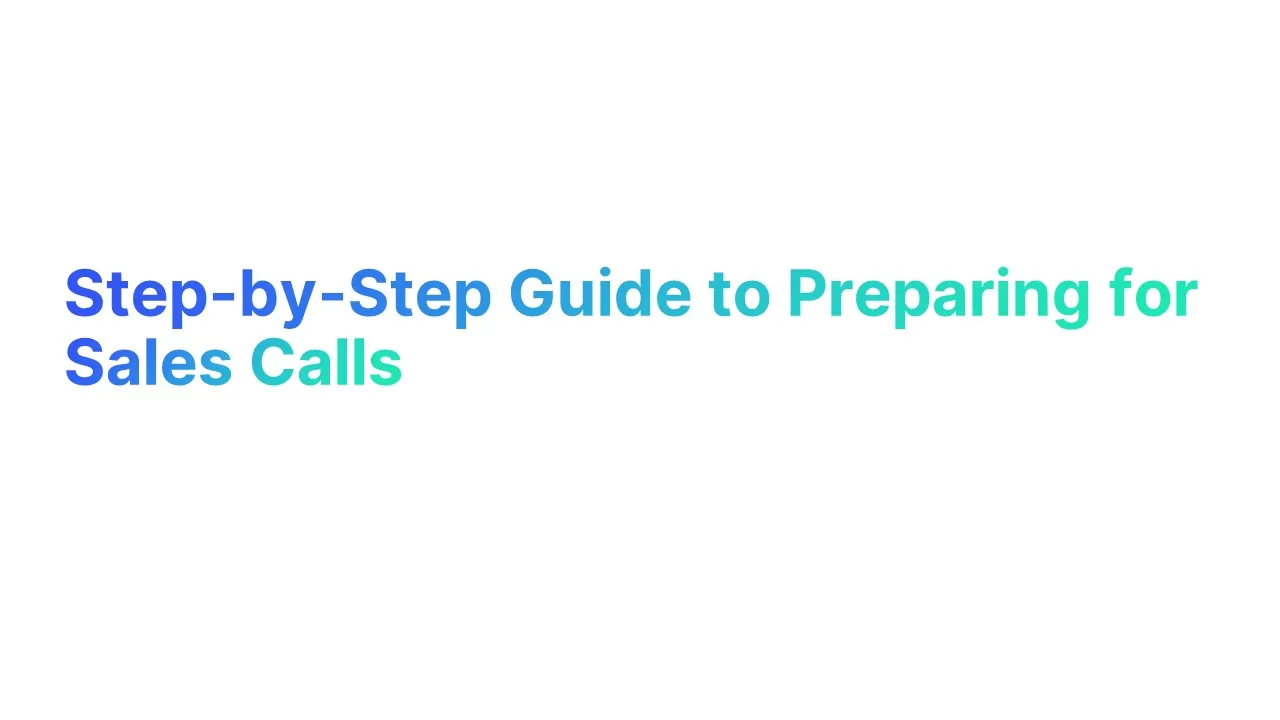
In-Depth Prospect Research: Understanding Your Potential Customer
Embarking on successful sales calls begins with knowing your prospective customer. In-depth prospect research involves diving into their business model, understanding their market position, and identifying the decision makers. This step is crucial in tailoring your approach to meet their unique needs and pain points.
Techniques for Prospect Research:
- Analyzing the prospect's business website and social media profiles.
- Studying industry reports to understand market trends affecting the prospect.
- Utilizing market research to gather insights on the prospect's competitive landscape.
Tailoring Your Approach for Your Potential Customer
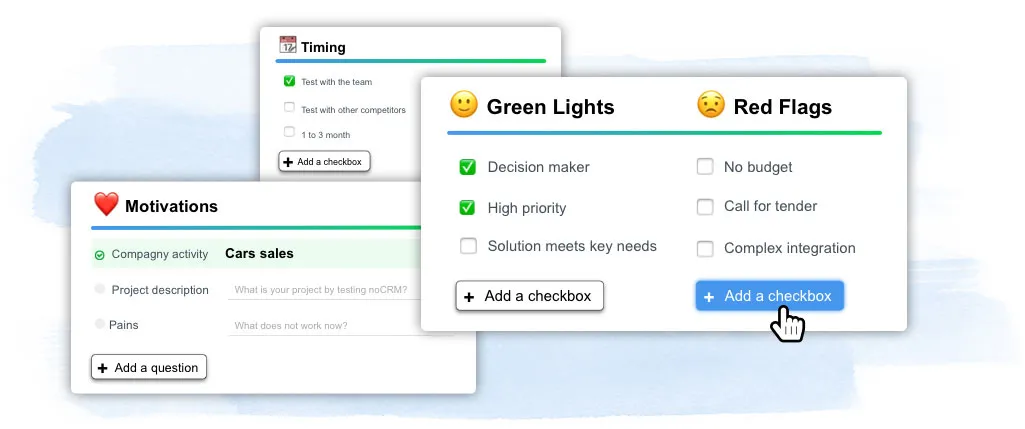
Developing a custom sales call script is pivotal.
This script should resonate with your prospect's specific needs and preferences, demonstrating your understanding of their business and how your product or service can offer value.
Elements of an Effective Sales Call Script:
- A warm greeting that builds rapport.
- Questions that uncover the prospect's challenges and objectives.
- Talking points that align your offering with the prospect's needs.
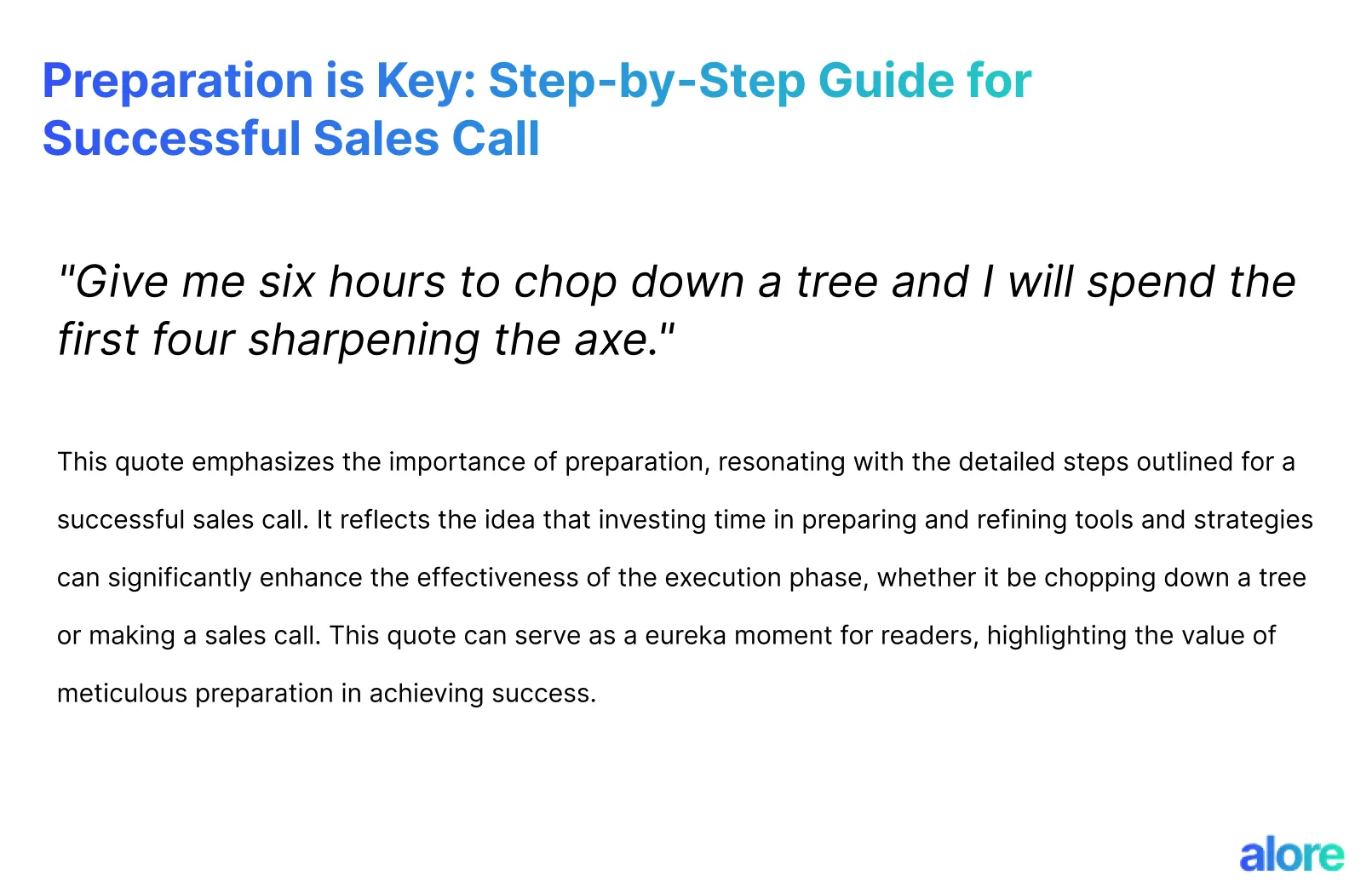
Identifying Prospect's Pain Points
Uncovering the challenges and issues your prospective customer faces is a key step.
This involves asking pointed questions during the call and actively listening to their responses, thus enabling you to position your product or service as the solution to their specific problems.
Articulating Product Value
The next step is to articulate the value of your product or service.
This involves explaining how your offering addresses the identified pain points, using concrete data and examples to illustrate its benefits and return on investment (ROI).
Preparing for Potential Objections
Anticipating potential objections is a critical part of preparation. This means having ready responses for common concerns and likely objections, backed by data, case studies, or testimonials, to reassure the prospect and validate your offering.
Setting Call Objectives and Agenda
Establishing clear objectives and an agenda for the call ensures that the conversation remains focused and productive. This includes setting specific goals for the call, such as securing a follow-up meeting or a commitment to a trial.
Rehearsing Your Pitch
Practicing your sales pitch is essential for a confident delivery. This rehearsal should focus on refining your messaging, ensuring clarity, and polishing your delivery to engage the prospective customer effectively.
Organizing Supporting Materials
Gathering all necessary documentation, case studies, or supporting materials before the call is important. These materials should be ready to share with the prospect to reinforce your points and provide tangible evidence of your product’s effectiveness.
Technical Setup and Testing
Ensuring that all technical aspects are in order for virtual sales calls is crucial. This includes testing your video conferencing tools, ensuring a stable internet connection, and checking audio and the video call quality.
Mental Preparation and Confidence Building
Finally, mental preparation and confidence building are key. This can involve strategies like visualization, reviewing successful past calls, or even brief exercises to boost confidence.
Executing the Sales Call: Techniques and Conversations

Mastering the Cold Call: Strategies for Cold Calling Success

Cold calling, often seen as daunting, is a crucial element in the sales process. To excel in cold calls, preparation and confidence are key.
Start by researching your potential customer, understanding their business model, and identifying key decision-makers.
Tailoring your approach can transform a cold call into a successful sales call in a few ways. Remember, the goal is to build rapport and introduce your product or service in a way that addresses the prospect's pain points
Key Strategies:
Use a Friendly Greeting to Establish a Comfortable Atmosphere:
"Good morning, [Prospect's Name], this is [Your Name] from [Your Company]. How's your day going so far?"
"Hello [Prospect's Name], I'm [Your Name] with [Your Company]. I hope you're having a great day. May I have a moment of your time?"
Quickly Articulate the Purpose of Your Call:
"I'm calling to introduce a new [product/service] that has helped businesses like yours increase [specific benefit]."
"The reason I’m reaching out today is to discuss how our [product/service] might help solve [a common industry problem]."
Ask Open-Ended Questions to Understand the Prospect’s Needs:
"Can you tell me about some of the challenges you're currently facing in [relevant business area]?"
"I'm curious to know, what strategies are you currently using to manage [specific issue or process] in your company?"
Engaging Sales Conversations: Building Rapport and Identifying Needs
Effective sales conversations hinge on your ability to engage the prospective customer.
This involves more than just selling a product or service; it's about building a relationship. Start by understanding their needs, then articulate how your offering can help.
Remember, a good sales call is a two-way conversation; a good sales call is where you listen as much as you talk.
Tips for Engaging Conversations
Demonstrate Empathy and Understanding of the Prospect’s Situation:
- "I understand that managing [specific issue] can be quite challenging. We've worked with others in your industry facing similar hurdles."
- "I can see how that situation could be frustrating for you and your team. Our clients often tell us about similar experiences before using our solution."
Focus on Solving Problems, Not Just Selling Features:
- "Our product not only offers [specific feature], but more importantly, it helps resolve [specific problem], which I understand is a priority for your business right now."
- "Rather than just going through our product features, I'd like to focus on how we can help streamline your process and improve [specific outcome]."
Keep the Conversation Natural and Avoid Sounding Like a Sales Script:
- "I'm curious, how have you been handling [specific issue] up till now?"
- "Let's talk about what your ideal solution looks like. What are some must-haves for you?"
Sales Process Nuances: From Phone Calls to Video Calls
The sales process has evolved with technology, and adapting to different formats is crucial.
Phone calls offer a personal touch, while video calls add a visual element, making it more engaging.
Regardless of the format, the core principles of successful sales calls remain the same: adequate preparation beforehand, clear communication, and a focus on the customer’s needs.
Sales Call Dynamics: From Cold Calls to Scheduled Calls
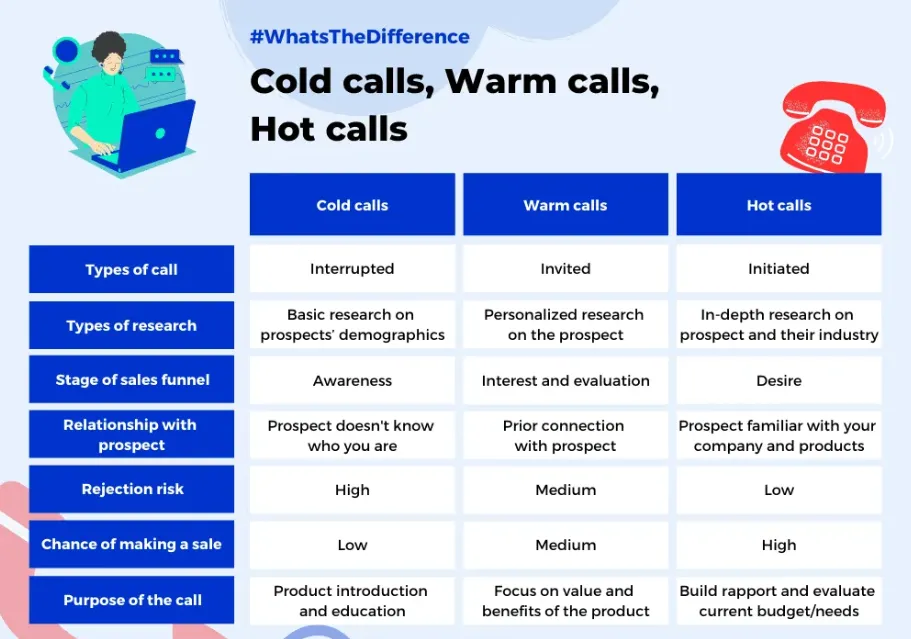
Understanding Different Sales Call Types: Cold, Scheduled, and Follow-up Calls
Sales calls, the lifeline of successful sales, vary in their approach and purpose.
Cold calls are your initial contact with potential customers, often requiring a convincing sales pitch to capture their interest.
Scheduled calls, on the other hand, are planned discussions with prospects who have already shown interest, making them a critical phase in the sales process.
Follow-up calls, a form of making sales calls, are essential to maintain momentum, address any lingering pain points, and inch closer to closing the deal.
- Key Considerations:
- Cold Calls: Focus on building rapport and effectively introducing your product or service.
- Scheduled Calls: Delve deeper into the prospect's needs and how your offering aligns with them.
- Follow-up Calls: Reinforce the value proposition and address any new or unresolved issues.
The Anatomy of Good Sales Calls: Balancing Selling and Serving
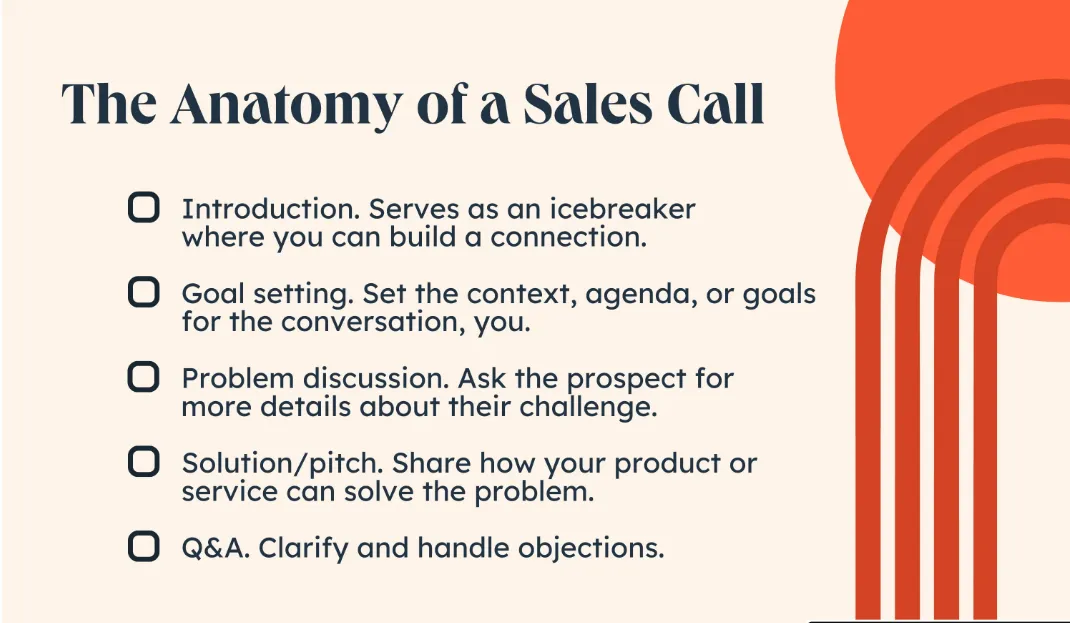
A successful call is a delicate balance between selling your product or service and serving the customer's needs.
It requires understanding the prospect’s business, tailoring the sales call script to their specific context, and ensuring that each interaction provides value.
Whether a cold call or a scheduled call, the goal is to establish credibility and trust, making the potential client or customer feel heard and understood.
Effective Strategies:
- Demonstrate empathy and a deep understanding of the prospect's business challenges.
- Shift focus from aggressive selling to offering solutions that genuinely help the prospect.
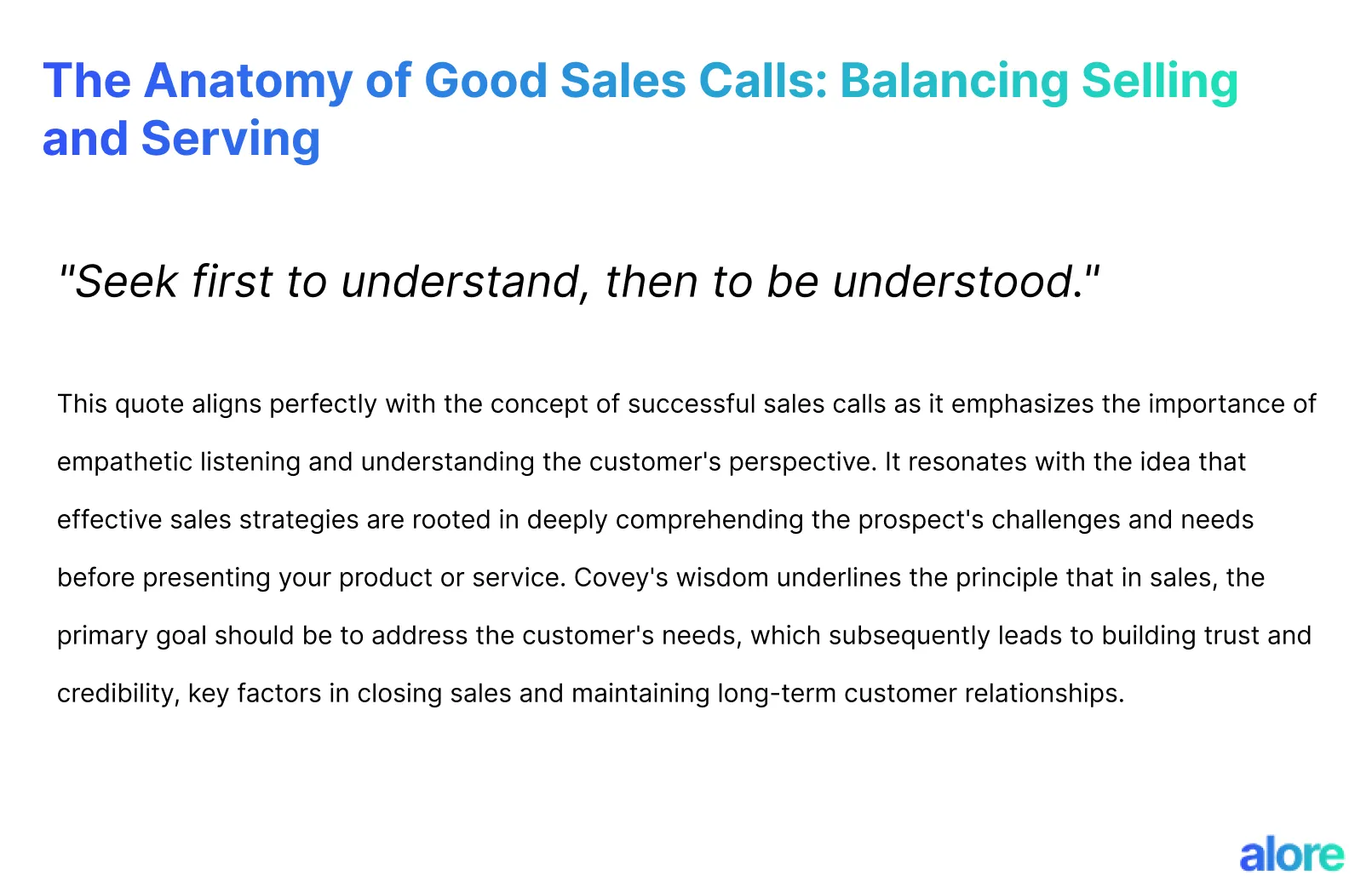
Sales Reps’ Role: From First Call to Closing
Sales reps are the architects of the sales strategy, guiding the customer journey from the first call to the final closing.
Their role involves more than just executing sales calls; it includes market research to understand the industry landscape, prospect research to personalize interactions and adept handling of objections.
Sales Reps’ Responsibilities:
- Build and maintain a relationship throughout the sales cycle.
- Continuously adapt strategies to meet evolving customer needs and market trends.
- Focus on providing a seamless experience from the first contact to closing the deal, ensuring customer satisfaction and future sales.
11 Key Practices for Every Sales Call

As a Sales Rep, you need to practice following every call
Initiate with Confidence
- Start with a friendly greeting.
- Confidence is key to setting a positive tone for the call.
Begin with a warm, friendly greeting to establish a comfortable atmosphere. This initial confidence is infectious and can help put your prospective customer at ease.
Set the Agenda
- Clearly state the call's purpose.
- Outline what you intend to cover.
Setting the agenda early helps manage expectations.
It guides the conversation and ensures both parties are on the same page. This clarity is crucial for a productive sales call.
Rapport Building
- Engage in light conversation to find common ground.
- Building rapport is about making a connection beyond business.
Creating a genuine connection with your prospect is vital.
Small talk can help in finding common interests, paving the way for a more relaxed and open conversation about their needs and how your product or service can help.
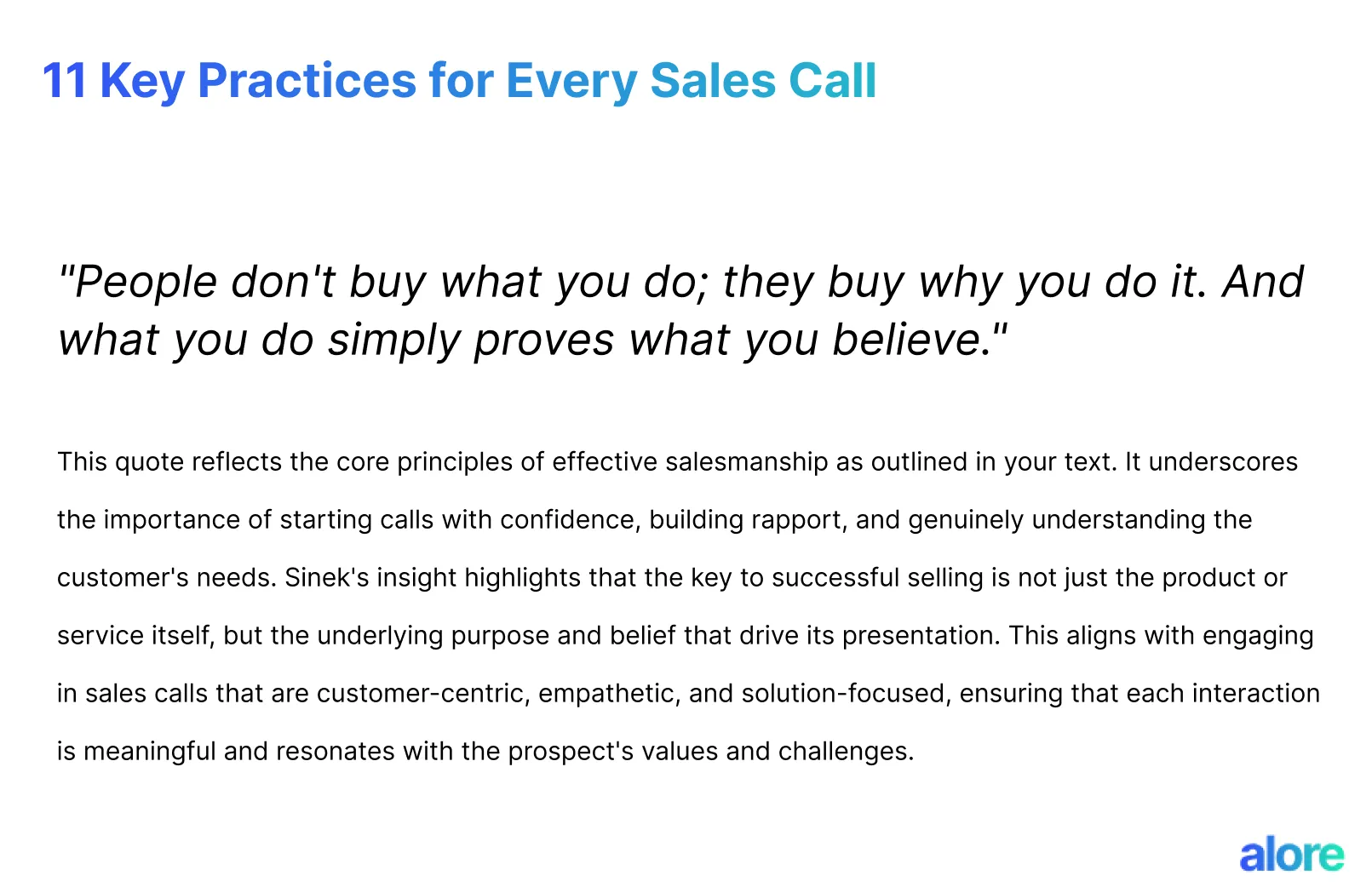
Understand Needs
- Ask open-ended questions.
- Listen actively to understand their challenges.
Understanding the prospect’s needs is crucial.
Ask questions that encourage them to speak about their challenges and listen actively. This understanding will guide you in tailoring your presentation to address their specific issues.
Present Solutions
- Align your product or service with their needs.
- Focus on benefits, not just features.
Present your product or service as a solution to their specific problems.
Highlight the benefits and how these will make a difference in their context rather than just listing the features.
Handle Objections

- Be prepared for potential pushbacks.
- Address objections with facts and empathy.
Handling objections effectively is a sign of a good salesperson.
Approach each objection with understanding and respond with clear, factual information in the same way that reassures the prospect.
Demonstrate Value

- Use data and examples to showcase benefits.
- Tailor the value proposition to their business context.
Demonstrating the value of your product or service is crucial.
Use data, case studies, or examples that resonate with the prospect's situation, showing them the tangible benefits they can expect.
Engage with Stories
- Share success stories relevant to their situation.
- Stories can illustrate the practical application of your product or service.
Stories and anecdotes make your pitch relatable and memorable.
Share success stories of how your product or service has helped others, especially in situations similar to theirs.
Encourage Questions
- Invite the prospect to ask questions.
- Clarifying questions can lead to deeper engagement.
Encouraging questions clarify doubts and deepens the prospect’s engagement with your pitch. It provides an opportunity to address specific concerns they might have.
Close Effectively
- Summarize key points and propose clear next steps.
- A strong close is decisive and leaves no ambiguity about the next steps.
Conclude your sales call with a summary of key points and suggest clear next sales steps.
Whether scheduling a follow-up call or moving towards a purchase decision, an effective close is direct and leaves no room for ambiguity.
Follow-Up Promptly

- Send a summary email reiterating key points.
- Quick follow-ups keep the momentum going and show your commitment.
Prompt follow-up after the call shows professionalism and keeps the dialogue moving forward.
A quick email summarizing the discussion can reinforce key points and maintain the connection established during the call.
Advanced Sales Call Tactics

Leveraging Market Research and Competitive Edge in Sales Strategy
Effective sales strategies are rooted in thorough market research.
It is crucial to understand your potential customer's business, their pain points, and how your product or service can offer solutions.
This approach enhances your sales calls and provides a competitive edge by aligning your strategy with current market trends.
Sales Training Essentials for Sales Professionals
Continuous training for sales reps is vital, especially in areas like cold calling, handling objections, and making successful sales calls.
Keeping the sales training updated with the latest sales strategies and market research ensures that the sales team can effectively engage with potential new customers and existing clients.
Decision-Making Process: Influencing Purchase Decisions
Understanding and influencing your customer's decision-making process is key to successful sales calls.
Your sales pitch should be tailored to address your prospective customer's specific needs and pain points, highlighting how your product or service provides the ideal solution.
Scheduled Call Preparation: Crafting a Convincing Sales Pitch
For scheduled calls, preparation is crucial.
Understanding the prospect's business, their industry, and their specific needs allows you to craft a good sales pitch that is both convincing and tailored to their unique situation.
This approach helps in building rapport and fostering a successful sales relationship.
Post-Sales Call Strategy: Following up Effectively
An effective post-sales call strategy includes prompt follow-up. This might involve sending a summary email, setting up the next steps, or scheduling follow-up calls.
The follow-up should reinforce the value proposition discussed during the call and keep the conversation moving toward a successful sale.
Post-Sales Call Strategy: 10 Tips for Making It Count

Conduct a Thorough Call Analysis
- Review the sales call recording or notes.
- Analyze the prospect's responses, tone, and engagement level.
After each sales call, take the time to conduct a detailed analysis. This involves reviewing the conversation, understanding the prospective customer's reactions, and identifying areas of success and improvement.

Document Key Takeaways and Action Items
- List significant points discussed.
- Note any commitments or follow-up actions required.
Documenting key takeaways helps in keeping track of the prospect's needs and your commitments. This step is essential in ensuring nothing falls through the cracks and that each sales call moves you closer to a successful sale.
Send a Prompt Follow-Up Email
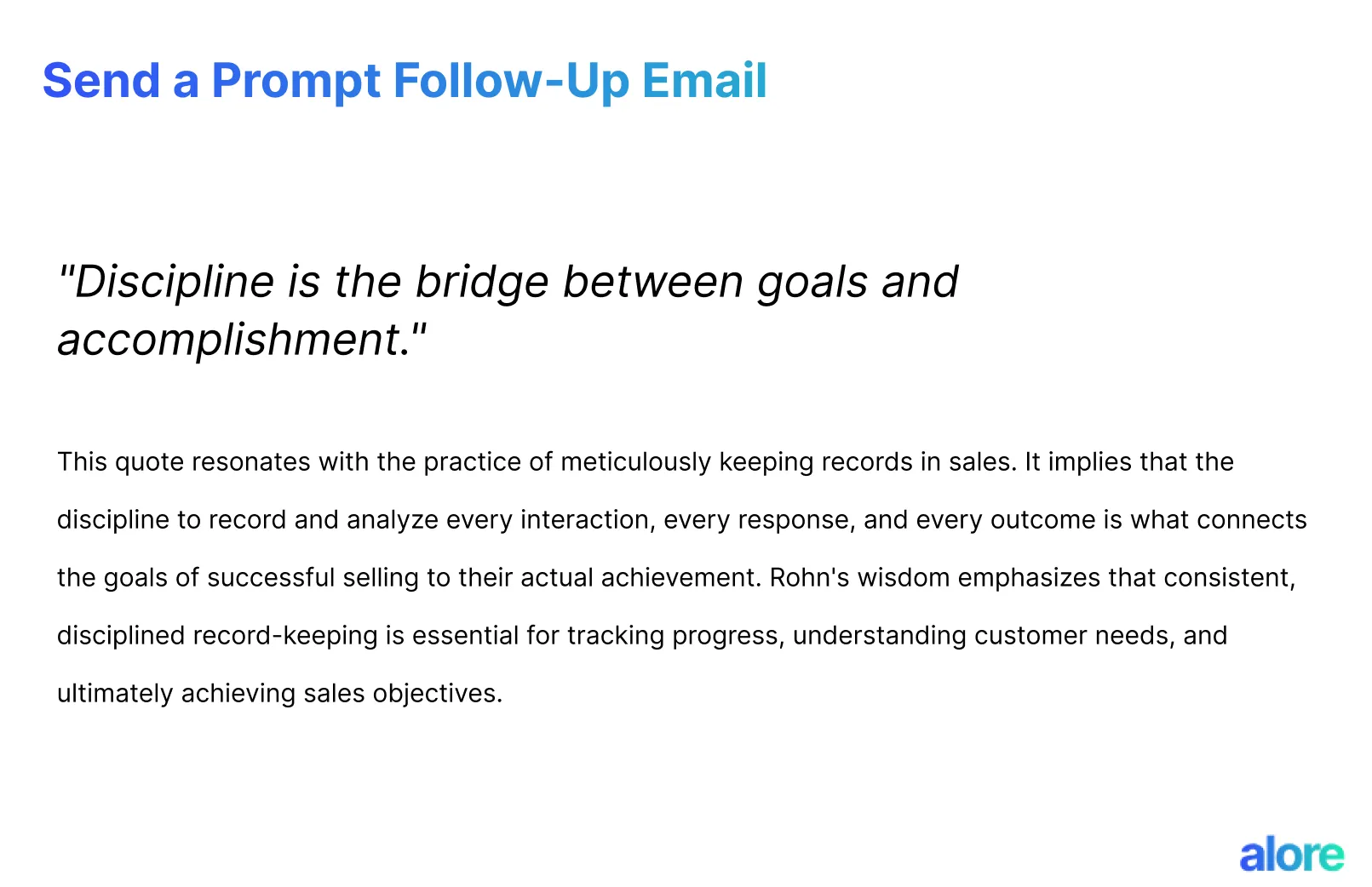
- Summarize the call and next steps.
- Reiterate any important points or agreements.
Sending a follow-up email promptly after the call shows professionalism and keeps the conversation fresh in the prospect's mind.
This step is crucial for maintaining momentum and clarity.
Schedule Next Steps and Follow-Up Meetings
- Set clear dates and objectives for future interactions.
- Ensure both parties are clear about what’s expected next.
Scheduling the next steps solidifies the progress made during the call. Setting a date keeps the sales process moving forward, Whether to prepare for a sales follow-up call, a demo, or a meeting with decision-makers.
Update Your CRM System
- Input relevant information from the call.
- Use this data to track the prospect's journey.
Updating your CRM system with information from the next sales call ensures that all relevant data is recorded.
This is vital for maintaining an organized approach to your sales calls and prospect management
Develop a Customized Solution or Proposal
- Tailor your offering based on the prospect's specific needs.
- Highlight how your solution addresses their pain points.
Develop a solution or proposal that speaks directly to the prospect's needs based on the insights gained during the call. This customization can significantly increase the chances of a successful sale.
Engage in Continuous Prospect Engagement
- Maintain regular contact through emails, newsletters, or calls.
- Keep the prospect engaged with relevant content and updates.
Continuous engagement is key to keeping your brand at the top of the prospect's mind. Regular, meaningful contact can nurture the relationship and build trust over time.
Seek Feedback and Refine Your Approach
- Request feedback about the call and your approach.
- Use this feedback to improve your sales tactics.
Asking for and acting on feedback demonstrates your commitment to meeting the prospect's needs and continuously improving your sales process. It’s an important step in building a relationship based on trust and mutual respect.
Monitor Prospect’s Market and Industry Trends
- Stay informed about changes in the prospect's industry.
- Use this knowledge to offer relevant and timely solutions.
Understanding the market and industry trends affecting your prospect can provide you with valuable insights. This knowledge allows you to anticipate their needs and offer relevant and timely solutions.
Reinforce Relationships with Regular Check-Ins
- Periodically check in to reinforce the relationship.
- Discover evolving needs or opportunities.
Regular check-ins help maintain the relationship built during the sales calls. These interactions can uncover new needs or opportunities, paving the way for future best sales calls or referrals
Sale Calls Analytics and Technology
Utilizing Sales Cloud and CRM Tools for Sales Call Analysis
Incorporating Sales Cloud and CRM tools is pivotal for modern sales call analysis.
These technologies offer invaluable insights into every interaction, allowing sales reps to track their performance and understand potential customers' needs more deeply and if high-quality leads are coming in or not.
Sales Metrics and Data: The Foundation of Successful Sales Calls
By paying close attention to specific metrics such as call duration, conversion rates, and direct feedback from potential customers, sales professionals can clearly understand what works and what doesn’t.
This data-driven approach allows for continuous refinement of sales techniques, ensuring that each sales rep and call is more effective than the last.
Conclusion: Harnessing Key Elements for Sales Success
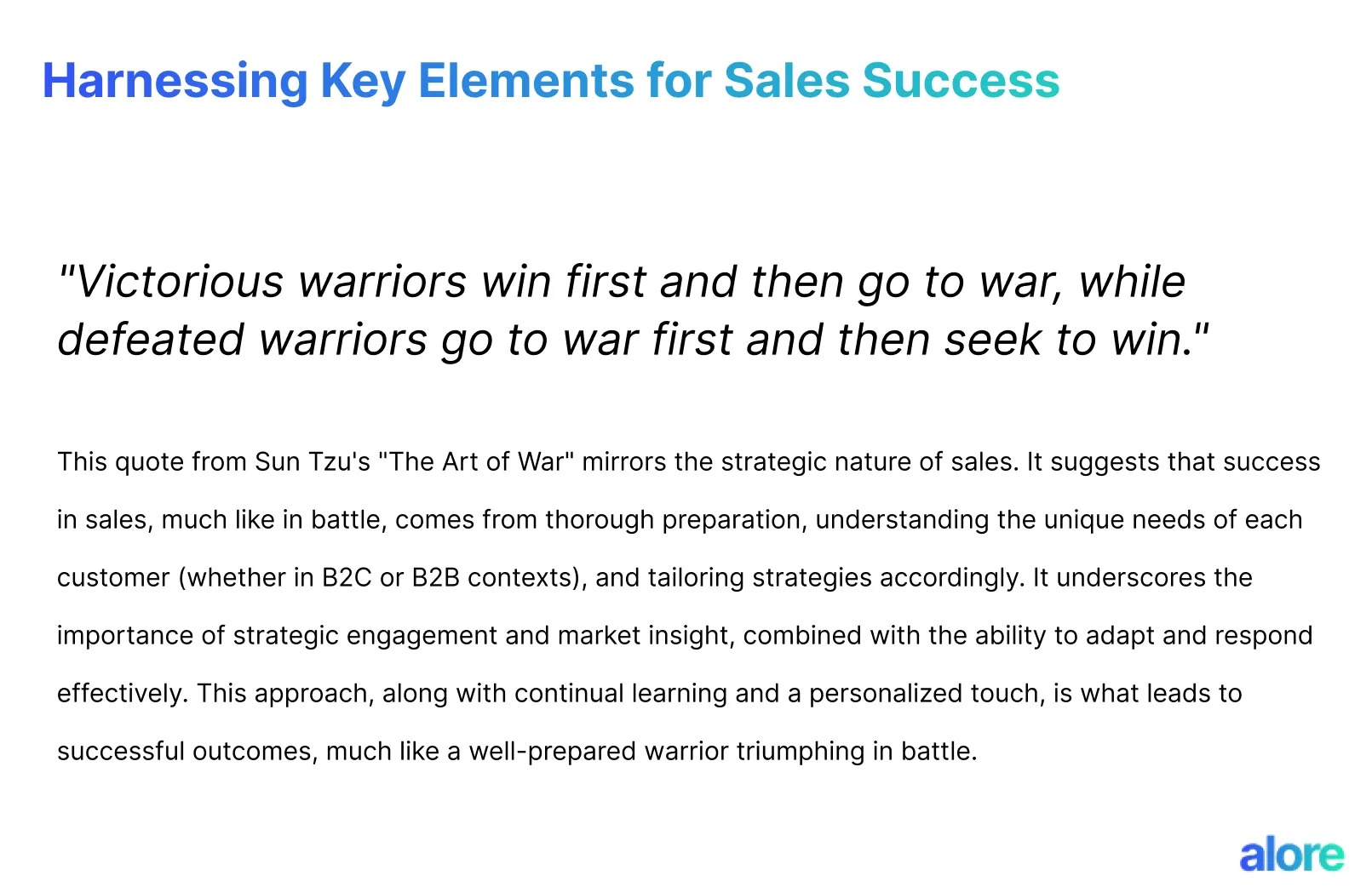
A key area often overlooked is the variation in approach - the business-to-customer and business-to-business dynamics, which require distinct approaches.
For instance, sales reps need to be adept at identifying the unique needs of each potential customer, especially in scenarios where scheduled calls are a norm. This skill is critical in securing more deals.
Sales scripts are often underutilized, missing out on the opportunity to guide sales conversations strategically.
A notable gap is also seen in making a successful sales call, where the focus should be on tailoring the pitch to suit different client profiles.
Additionally, the art of making calls effectively lies in adapting and responding in real time to customer queries and concerns. Next call preparation is as important as the initial interaction, ensuring each touchpoint builds towards a successful closure.
Combining these elements – strategic engagement, market insight, continual learning, and personalized approach – is key to creating a successful sales strategy. It's about understanding that each sales call is an opportunity to meet and exceed the expectations of potential customers, thereby paving the way for future sales and lasting business relationships.







